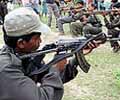
Dec 22: Citing Naxalism as the lone biggest threat to nation’s internal security, Prime Minister Manmohan Singh on Thursday, while addressing a conference on internal security attended by chief ministers of all states, stressed the need of a special force for curbing the growing Naxalism and terrorism menace.
Talks were also made on the development and strengthen of police forces and intelligence machinery. With this there seems a good political initiative that has been lacking since time but “Is this the right answer” is still a question.
No doubt the Naxal problem is spreading across the country and hence PM’s statement to establish a trained force is apt at a time when a large number of people are living under naxal threat.
States are demanding more and more funds to deal with this problem but on the other hand the allocated funds by the central government goes unplanted.
States like Orissa urged the Central government to increase financial assistance to modernise police force that means earlier there was no such effort or if so then there must be an absence of better mechanism.
Gujarat chief minister Narendra Modi criticised ‘Centre’ for its soft policy on terrorism citing the earlier anti-terrorism law POTA and that is why BJP ruled states like Rajasthan, Madhya Pradesh called for revival of POTA.
It shows a lack of coordination and consensus between states and central administration. Also leadership in different states somehow missed to address the basic problems in the naxal-affected regions: social inequalities, poverty, and unemployment that later in totality create disorder in law and order.
On one hand states demanded to set up a federal agency to tackle crime and terror but with political instability and differences this may later create another foray on the independence of state machinery, which can impose a bigger internal crisis.
Moreover, what the utmost need of the hour is to build a better Centre-State cooperation whether in terms of modernising security, economic development or a widely accepted anti-terror law. There should be a concerted effort to find out a long-term solution of this menace; law and order is only a short-term answer whereas development issue in those naxal affected areas is the only effective measure to counter the problem.
It seems that on one hand as some points out, the life of Naxals, which is grounded with land and unless there is policy on land reforms and equitable development there is no solution to this question. However, on the other half, politicians do come up with a different answer as according to them sometimes Naxals themselves oppose development policy as in case of the ‘Red Corridor’ project - aims a better connectivity in the Naxal distressed states. This creates a different scenario altogether but in a larger context development should be the key.
|
|


Comments: